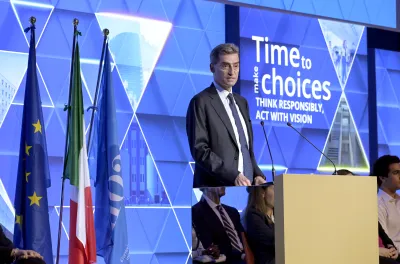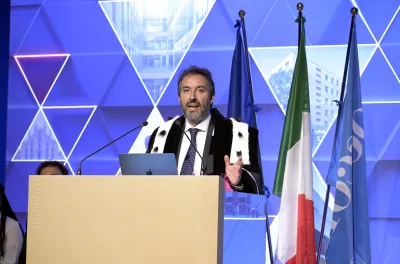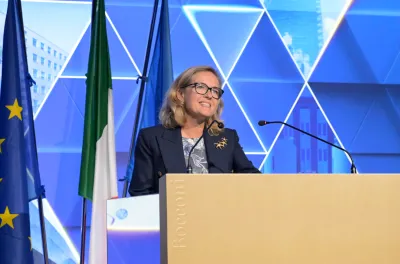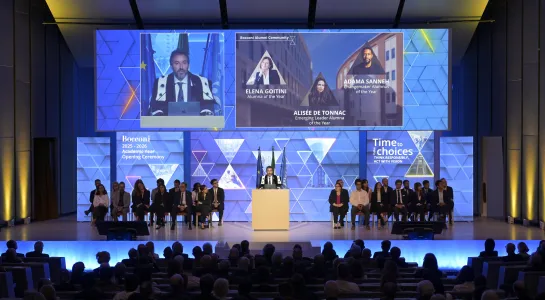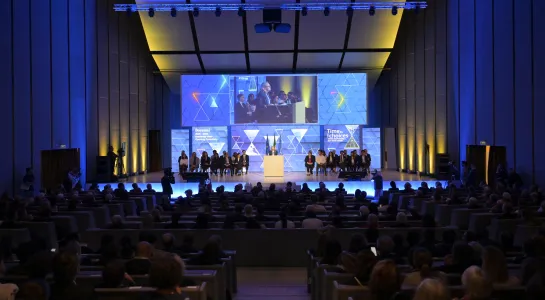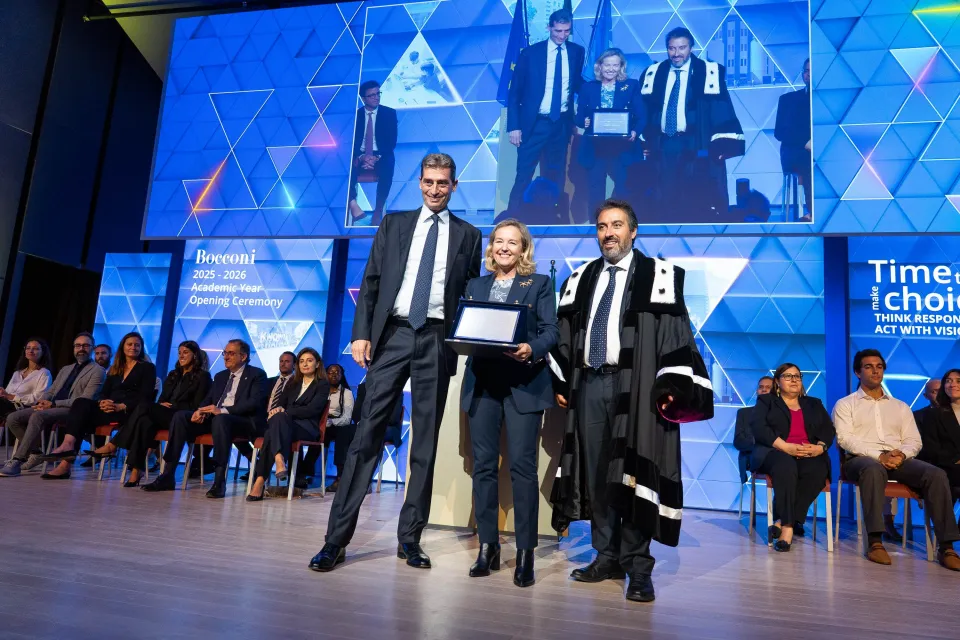
Choices, Not Excuses: Bocconi Launches Its Message for the Future
In the heart of the Bocconi campus, the 2025–2026 academic year began with speeches by President Andrea Sironi, Rector Francesco Billari, and President of the European Investment Bank and former Vice President of the Spanish Government Nadia Calviño, the ceremony’s guest of honor. In a crowded Aula Magna with students, faculty and alumni, as well as national and international guests, the opening ceremony was transformed into a moment of collective reflection — not only on what it means to be a university today, but also on what the role of academic institutions should be in a time marked by instability, continuous crises, and difficult choices.
“Weakening academic freedom and limiting the independence of universities means to compromise their essential missions: research, teaching and the ability to contribute to the progress of society,” said Sironi. “Even in the absence of drastic measures, such as the cutting of funding, what effect will this have on academic research, if researchers practice self-censorship to avoid controversial topics? How can we teach students critical thinking if the university is not home to pluralism and the fullest diversity of ideas and opinions?”
With an evoking image — an hourglass that runs silently, without an alarm, but full of consequences — Billari opened his speech with a direct message: “We live in an age of permaemergency, in which strategic decisions are postponed and the process of planning risks giving way to the anxiety of the present. But delaying the decision — today more than ever — is in itself a choice, often the wrong one.”
The University as an Infrastructure of Democracy
In his speech, Billari recalled a phenomenon that now affects even mature democracies: the weakening of trust in universities. From censorship of academic and research programs in the United States, to ideological pressures in Eastern Europe, the attack on freedom of thought is no longer an exception.
“When you target universities, you target democracy,” he said. “Because it is in universities where free thought is formed, pluralism is defended, and reasoned dissent is experimented. And democracy needs all of this, today more than ever.”
He emphasized that Bocconi rejects the role of the “ivory tower” and proposes itself as a public actor: a place where knowledge meets responsibility, and freedom translates into concrete impact.
A Community That Chooses to Show Up
The title of the event — Time to Make Choices. Think Responsibly, Act with Vision — is a declaration of intent: choosing to show up today means actively committing to building a fairer, more open and more informed future.
“Every day we choose how to use our time: for research, for inclusion, for shaping conscious citizens. Every well-made choice is a leap of faith in the future,” said the Rector.
The numbers also mark a strong signal: applications for Bachelor degree programs for 2025–2026 reached a new record, with a 25% increase among international students. More than 64% of applications come from abroad: France and Turkey remain the top two countries, but — for the first time — the United States ranks third. Internationalization is also evident in the composition of classes and faculty, with 120 nationalities represented.
Research That Matters, Research That Impacts
The choice to put research at the center lies at the heart of the University's strategic vision, which will be renewed in the 2026–2030 Strategic Plan currently being finalized. Not as a self-referential exercise, but as a tool for interpreting the world, orienting policies, and strengthening citizenship.
“Science does not advance by chasing trends, but by choosing unexplored paths,” said Billari, citing a Bocconi study published in Econometrica.
Bocconi today can count on 72 projects funded by the European Research Council since the start of the program: 36 are currently active, with seven awarded in the last year alone. Sectors range from artificial intelligence and pure mathematics, to the labor market and sustainable development.
But investing in research, as the Rector highlighted, also means investing in the education of future researchers. It is with this in mind that the PhD School is growing and a new PhD in Mathematics and Applications will be launched in the 2026–2027 academic year.
Designed to attract talent from all over the world, the program will have a strong interdisciplinary approach and theoretical rigor, strengthening Bocconi's presence in STEM disciplines. It will complement the five existing programs, expanding opportunities for excellent doctoral education that can generate lasting impact in science and society.
AI, Health, Entrepreneurship: Knowledge as a Lever for Change
Artificial intelligence is one of the most important challenges to the freedom of our digital societies. Through the AI Lab, led by Riccardo Zecchina, Bocconi is prepared to face it with an interdisciplinary approach and responsibility. The AI Lab combines theoretical research and practical applications in educational, managerial and social contexts.
In collaboration with OpenAI, the University was the first in Italy — and among the first in Europe — to offer to its entire community equal access to the most advanced AI tools. Early joint projects include simulations with intelligent agents to test economic and social theories, the measurement of abstract concepts in text and video, and the creation of personalized educational assistants.
An example of multidisciplinary research is the Health Emergencies Analytics Lab (HEAL), an evolution of the Covid Crisis Lab, which addresses global issues of public health, prevention and resilience. Coordinated by Alessia Melegaro, the workshop involves all Bocconi departments and is funded by Fondazione Invernizzi.
Another frontier is entrepreneurship. Promoted by the Tech Europe Foundation (TEF) — created in partnership with the Fondazione Politecnico di Milano and other institutional players — Bocconi launched TEF Ignition, a program that brings students closer to the world of startups and innovation. Additionally, the new MSc in Innovation, Technology and Entrepreneurship will be launched in 2026–2027 with a revised and even more impact-oriented curriculum.
An Active Role in the Olympics
In 2026, Milan will host the Olympic and Paralympic Games. Bocconi will be an active part of the event, thanks to an agreement signed with Fondazione Milano Cortina 2026. Students have already been applying as volunteers (over 1,400 applications so far), while scientific research will also lend a tangible contribution. A study coordinated by Dino Ruta will analyze the impact and legacy of the Games according to IOC and the OECD guidelines. At the same time, the Research in Motion initiative will bring physical activity and scientific outreach to campus in a single interactive path, sponsored by the Lombardy Region as part of the Cultural Games.
Faith in Generations, Without Rhetoric
A central passage of Billari's speech concerned the pact between generations, now put in crisis by mistrust, inequality and instability. Billari recalled that Italy is one of the few European countries where people work less while living longer. They also leave home later, so new generations struggle to build a future. Yet, never before have different generations coexisted and had to collaborate. For this reason, universities must become a space for dialogue and co-creation — not only between students and faculty, but between knowledge, experiences and languages.
“Every lesson is a leap of faith, but it is also a choice: to not give up on complexity,” said Billari.
At Bocconi, this means teaching that incorporates learning in the classroom with real projects, theory with experimentation, and research with social impact. With more than 14,000 professionals trained every year by SDA Bocconi and 2,600 students involved in our international programs, the University builds bridges between knowledge and action every day.
A Growing Community: Alumni, Donors, Businesses
With over 146,000 alumni worldwide and more than 3,000 active donors in 2024 alone, Bocconi is currently a global crossroads of new ideas, energy and expertise. It is a living community that grows and transforms, yet remains united by a common idea: to restore value, generate the future, and invest in knowledge as a common good.
Among the most heartfelt moments of the ceremony was remembrance for Bocconi historian Achille Marzio Romani, who recently passed away. Another was the Bocconi Alumni Community presentation of the 2025 Alumni Awards, which celebrate the impact of those who contribute to improving society with their work:
- Elena Goitini, CEO of BNL and Country Head for Italy of the BNP Paribas Group, was awarded Alumna of the Year
- Alisée de Tonnac, Co-founder and Co-CEO of Seedstars, was awarded Emerging Leader
- Adama Sanneh, Co-Founder and CEO of the Moleskine Foundation, was awarded Changemaker of the Year
With alumni involvement, the culture of giving continues to strengthen. In the four-year period of 2021-2024 alone, almost €70 million was raised between 2021–2024 alone — a sign of growing confidence in the University's mission.
Donations focus on four strategic areas: Inclusion, Social Sciences, Social Responsibility and Community. A total of 60% of the funds raised are directly allocated to support students through merit- and need-based scholarships. It is a commitment that not only allows 2,000 young people to attend Bocconi tuition-free every year, but that also permits one in three students to benefit from financial aid, thus ensuring the education of an informed and impactful generation.
Philanthropic support also fuels cutting-edge research and the most innovative initiatives. Thanks to their contribution, there are now two named research centers, eight research laboratories, and 24 named chairs — two of which were announced just this year.
The first is the Enel Foundation Chair in Competitiveness and Transition, which will be assigned to Francesco Decarolis, Full Professor in the Department of Economics. He will study the delicate balance between energy transition and competitiveness, and the role of policies in building fair and resilient markets.
The second is the Harvey Chaplin Chair in Distribution, Channel & Experience Management, funded by Campari, which will be entrusted to Sandro Castaldo — Full Professor in the Department of Marketing. The goal is to develop frontier research on distribution channels and customer experience in a changing economy.
Choosing to Show Up — to Truly Show Up
“This University is not just a place of learning: it is a collective project, built every day by those who choose to show up,” Billari concluded. “ And in the grain of time that is entrusted to us, each of us has the opportunity — and the responsibility — to make a difference.”
